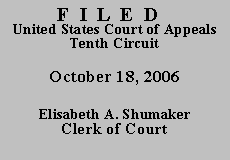

| JAMES RICKEY EZELL, III, |
|
| v. | |
| MIKE MULLIN, Warden, |
On August 19, 1998, Mr. Ezell was arrested at a motel in Tulsa, Oklahoma, in possession of a baggie containing 5.24 grams of crack cocaine. Charged with (1) trafficking in illegal drugs, (2) resisting an officer, and (3) public intoxication, he was found guilty on all three counts on November 9, 2000, and was sentenced to terms of imprisonment of 70 years on the first count, one year on the second, and 14 days on the third. The Oklahoma Court of Criminal Appeals affirmed Mr. Ezell's convictions but lowered his sentence on the first count to 40 years because of ineffective assistance of counsel at second-stage proceedings.
On January 10, 2003, Mr. Ezell filed an application for habeas relief in the United States District Court for the Northern District of Oklahoma. The district court denied his application on July 17, 2006, and his request for COA on August 10, 2006.
A COA will issue "only if the applicant has made a substantial showing of the denial of a constitutional right." 28 U.S.C. § 2253(c)(2). This standard requires "a demonstration that . . . includes showing that reasonable jurists could debate whether (or, for that matter, agree that) the petition should have been resolved in a different manner or that the issues presented were adequate to deserve encouragement to proceed further." Slack v. McDaniel, 529 U.S. 473, 484 (2000) (internal quotation marks omitted). In other words, the applicant must show that the district court's resolution of the constitutional claims was either "debatable or wrong." Id.
The Antiterrorism and Effective Death Penalty Act of 1996 (AEDPA) provides that when a claim has been adjudicated on the merits in state court, a federal court will grant habeas relief only when the applicant establishes that the state-court decision was "contrary to, or involved an unreasonable application of, clearly established Federal law, as determined by the Supreme Court of the United States," or "was based on an unreasonable determination of the facts in light of the evidence presented in the State court proceeding." 28 U.S.C. § 2254(d)(1), (2).
Under the "contrary to" clause, we grant relief only if the state court arrives at a conclusion opposite to that reached by the Supreme Court on a question of law or if the state court decides a case differently than the [Supreme] Court has on a set of materially indistinguishable facts. Under the "unreasonable application" clause, relief is provided only if the state court identifies the correct governing legal principle from the Supreme Court's decisions but unreasonably applies that principle to the facts of the prisoner's case. Thus we may not issue a habeas writ simply because we conclude in our independent judgment that the relevant state-court decision applied clearly established federal law erroneously or incorrectly. Rather, that application must also be unreasonable.
Gipson v. Jordan, 376 F.3d 1193, 1196 (10th Cir. 2004) (internal quotation marks, brackets, and citations omitted). Therefore, for those of Mr. Ezell's claims that were adjudicated on the merits in state court, "AEDPA's deferential treatment of state court decisions must be incorporated into our consideration of [his] request for COA." Dockins v. Hines, 374 F.3d 935, 938 (10th Cir. 2004).
In denying the claims raised in Mr. Ezell's habeas application, the district court held that (1) under Stone v. Powell, 428 U.S. 465, 494 (1976), Mr. Ezell's illegal-arrest claim fails because he had a full and fair opportunity to litigate that claim in state court; (2) Mr. Ezell could not prevail on his challenge to jury selection because he had failed to show that the prosecutor intentionally discriminated on the basis of race in exercising peremptory challenges, and he had failed to present clear and convincing evidence to overcome the presumption that the trial court's factual finding of the juror's lack of impartiality was correct; (3) Mr. Ezell's challenge to the Oklahoma trafficking statute lacked merit because the district court was bound by a state-court interpretation that there was no irrebuttable presumption of mens rea in the statute, and Mr. Ezell had not established that a state-court determination that the statute did not deny him equal protection was contrary to or an unreasonable application of federal law; (4) the district court could not review a claim based on a state court's failure to give a lesser-included-offense instruction in a noncapital case, see Dockins, 374 F.3d at 938; and (5) the state courts had already granted Mr. Ezell all the relief to which he was entitled on his ineffective-assistance claim.
The district court's written order thoroughly explains why these claims were rejected. Reasonable jurists could not debate the correctness of the district court's denial of Mr. Ezell's claims. See Slack, 529 U.S. at 484.
We need not address the claims first raised by Mr. Ezell in his application for a COA from this court. See Parker v. Scott, 394 F.3d 1302, 1307 (10th Cir. 2005) (claims raised for the first time on appeal are deemed to be waived).
Accordingly, we DENY Mr. Ezell's application for a COA and DISMISS
the appeal.
ENTERED FOR THE COURT
Harris L Hartz
Circuit Judge
*.After examining the brief and appellate record, this panel has determined unanimously that oral argument would not materially assist the determination of this appeal. See Fed. R. App. P. 34(a)(2); 10th Cir. R. 34.1(G). The case is therefore ordered submitted without oral argument. This order and judgment is not binding precedent, except under the doctrines of law of the case, res judicata, and collateral estoppel. The court generally disfavors the citation of orders and judgments; nevertheless, an order and judgment may be cited under the terms and conditions of 10th Cir. R. 36.3.